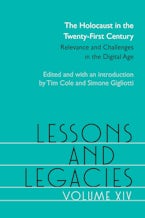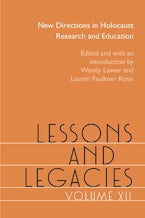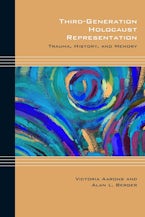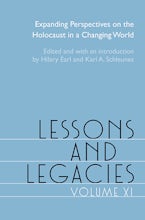HISTORY / Jewish
Showing results 1-10 of 15
Filter Results OPEN +

Lessons and Legacies XV
A collection of new research in Holocaust studies from the fields of history, literature, and memory studies
Lessons and Legacies XIV
This book reevaluates concepts such as Primo Levi’s “gray zone” and uses digital methodologies to examine mobility and space and their relationship to hiding, resistance, and emigration, focusing on the histories of individuals and social groups.
Lessons and Legacies XII
The essays in Lessons and Legacies XII present the most cutting-edge methods and topics shaping Holocaust studies today, from a variety of disciplines: forensics, environmental history, cultural studies, religious studies, labor history, film studies, history of medicine, sociology, pedagogy, and public history.
Third-Generation Holocaust Representation
In Third-Generation Holocaust Representation Victoria Aarons and Alan L. Berger address evolving notions of “postmemory”; the intergenerational and ongoing transmission of trauma; issues of Jewish cultural identity; inherited memory; the psychological tensions of post-Holocaust Jewish identity; the characteristic tropes of memory and the personalized narrative voice; issues of generational dislocation and anxiety; the recurrent antagonisms of assimilation and historical alienation; the imaginative re-creation and reconstruction of the past; and the future of Holocaust memory and representation.
Lessons and Legacies XI
“Expanding Perspectives on the Holocaust in a Changing World” was the theme of the eleventh Lessons and Legacies Conference on the Holocaust. The eighteen essays published here, which sprung from the conference, reflect questions that Holocaust scholars are asking in the face of shifting political, economic, social, and disciplinary contexts.
Heshel's Kingdom
The Orthodox rabbi Heshel Melamed's sudden death by heart attack in 1919 set his widow and children free to leave Lithuania. In this deeply personal memoir, his grandson journeys to the nation after the fall of Communism, and his story is both a philosophical tableau of secularism, religion, and family and a communion with history's darkness-and, where possible, its illumination.
And Yet I Still Have Dreams
And Yet I Still Have Dreams is a departure from many Holocaust memoirs and biographies. Based on interviews with "Alex," an anonymous survivor of the Warsaw Ghetto and three concentration camps, the story follows him from his assimilated childhood to his coming to terms with his memories of the Holocaust as an older man. Alex is angry, pugnacious, and contemptuous of the stereotypes found in some survivor literature and honest about the shortcomings of other works.
Waiting for Hope
After the defeat of Germany in World War II, more than a hundred thousand Jewish survivors of the Holocaust were transported to camps maintained by the allies for displaced persons (DPs). In this...
Before Deportation
In 1939, Hertha Feiner sent her daughters Inge and Marion to Switzerland to escape the tightening Nazi vise in Berlin. Before Deportation compiles fifty-seven letters Feiner sent her to daughters between 1939 and 1942.
Invisible Walls and To Remember is to Heal
Ingeborg Hecht's father, a prosperous Jewish attorney, was divorced from his titled German wife in 1933—two years before the promulgation of the Nuremberg Laws—and so was deprived of what these laws termed "privileged mixed matrimony." He died in Auschwitz. His two children, called "half-Jews," were stripped of their rights, prevented from earning a living, and forbidden to marry. In Invisible Walls, Hecht writes of what it was like to live under these circumstances.

Lessons and Legacies XV
A collection of new research in Holocaust studies from the fields of history, literature, and memory studies
Lessons and Legacies XIV
This book reevaluates concepts such as Primo Levi’s “gray zone” and uses digital methodologies to examine mobility and space and their relationship to hiding, resistance, and emigration, focusing on the histories of individuals and social groups.
Lessons and Legacies XII
The essays in Lessons and Legacies XII present the most cutting-edge methods and topics shaping Holocaust studies today, from a variety of disciplines: forensics, environmental history, cultural studies, religious studies, labor history, film studies, history of medicine, sociology, pedagogy, and public history.
Third-Generation Holocaust Representation
In Third-Generation Holocaust Representation Victoria Aarons and Alan L. Berger address evolving notions of “postmemory”; the intergenerational and ongoing transmission of trauma; issues of Jewish cultural identity; inherited memory; the psychological tensions of post-Holocaust Jewish identity; the characteristic tropes of memory and the personalized narrative voice; issues of generational dislocation and anxiety; the recurrent antagonisms of assimilation and historical alienation; the imaginative re-creation and reconstruction of the past; and the future of Holocaust memory and representation.
Lessons and Legacies XI
“Expanding Perspectives on the Holocaust in a Changing World” was the theme of the eleventh Lessons and Legacies Conference on the Holocaust. The eighteen essays published here, which sprung from the conference, reflect questions that Holocaust scholars are asking in the face of shifting political, economic, social, and disciplinary contexts.
Heshel's Kingdom
The Orthodox rabbi Heshel Melamed's sudden death by heart attack in 1919 set his widow and children free to leave Lithuania. In this deeply personal memoir, his grandson journeys to the nation after the fall of Communism, and his story is both a philosophical tableau of secularism, religion, and family and a communion with history's darkness-and, where possible, its illumination.
And Yet I Still Have Dreams
And Yet I Still Have Dreams is a departure from many Holocaust memoirs and biographies. Based on interviews with "Alex," an anonymous survivor of the Warsaw Ghetto and three concentration camps, the story follows him from his assimilated childhood to his coming to terms with his memories of the Holocaust as an older man. Alex is angry, pugnacious, and contemptuous of the stereotypes found in some survivor literature and honest about the shortcomings of other works.
Waiting for Hope
After the defeat of Germany in World War II, more than a hundred thousand Jewish survivors of the Holocaust were transported to camps maintained by the allies for displaced persons (DPs). In this...
Before Deportation
In 1939, Hertha Feiner sent her daughters Inge and Marion to Switzerland to escape the tightening Nazi vise in Berlin. Before Deportation compiles fifty-seven letters Feiner sent her to daughters between 1939 and 1942.
Invisible Walls and To Remember is to Heal
Ingeborg Hecht's father, a prosperous Jewish attorney, was divorced from his titled German wife in 1933—two years before the promulgation of the Nuremberg Laws—and so was deprived of what these laws termed "privileged mixed matrimony." He died in Auschwitz. His two children, called "half-Jews," were stripped of their rights, prevented from earning a living, and forbidden to marry. In Invisible Walls, Hecht writes of what it was like to live under these circumstances.








